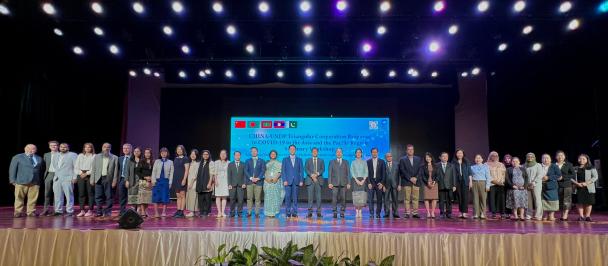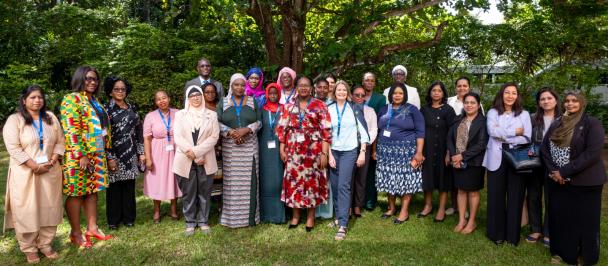Discussion with UNDP Bangladesh, North Macedonia, and Bosnia and Herzegovina on country-specific methods to address sexual and gender-based violence in the digital sphere
April 16, 2023

UNDP Seoul Policy Centre (USPC) and UNDP Country Offices (COs) in Bangladesh, Bosnia and Herzegovina, and North Macedonia co-organized a series of country-specific project inception meetings to discuss methods of combating digital sex crimes on 23 February 2023. The Korean National Police Agency (KNPA) shared Korea’s good practices in tackling cyber violence against women and girls – while representatives from COs and their national partners presented their respective country-specific proposals to improve current frameworks and identified potential challenges in implementing improved systems.
Dr. Anne Juepner, Director of USPC, welcomed the multi-stakeholder initiative on digital sex crimes, as did Mr. Hyung Se Lee, Director General for Foreign Affairs of KNPA, who emphasized the importance of strengthening the police capacities of partner countries. Representatives of COs and their respective partner agencies acknowledged the severity of digital sex crimes and expressed anticipation for the upcoming collaboration via USPC’s SDG Partnerships Programme. Mr. Sungnam Jung, Digital Sex Crime Consultant of the USPC and Professor at Women and Juvenile Affairs Division of the Korean Police Investigation Academy, presented KNPA’s response against digital sex crimes, including the infamous ‘Nth Room’ case* which triggered massive changes in public awareness, as well as Korean legislation and institutional responses against digital sex crimes. KNPA has established a dedicated unit to prevent and mitigate digital sex crimes and vitalized international cooperation with global tech companies and investigative agencies to address the transnational nature of cybercrimes. Transitioning to a victim-centred approach, the Republic of Korea adopted a zero-tolerance policy against digital sex crimes and established a one-stop support system to provide victims with legal aid, victim counseling, and services to track and delete sextortion materials online.
* A massive digital sex crime case where perpetrators blackmailed women, including underage girls, into performing sexually explicit acts on camera, with thousands of users paying in cryptocurrency. The ‘Nth Room’ denotes the group of eight Telegram chatrooms that were involved in the crime, which were labeled using ordinal numbers.
Project inception meeting with Bangladesh

Ms. Shahreen Tilottoma, Programme Officer of UNDP Bangladesh CO, discussed the insufficiency of legal frameworks and victim-oriented support systems. For instance, a dedicated Cell in the Police Headquarters of Bangladesh Police called the ‘Police Cyber Support for Women (PCSW)’ operates a 24/7 hotline to report cyberviolence and provides counseling and legal services for victims. However, such services have limited functionality due to inadequate public awareness and formal training of police officers to enable timely and effective response. Through the joint initiative, the Bangladesh CO hopes to facilitate legislative and policy dialogue regarding digital sex crimes, establish a systematic capacity-building programme for police officers, and advocate reform of educational curricula to include safety and preventive education among youth.
Mr. Muntashirul Islam, Additional Inspector General of Bangladesh Police stated that digital sex crimes in Bangladesh are relatively less organized in nature than those in Korea and sought advice on how to navigate the different criminal landscape. Mr. Jung explained that individual digital sex crimes inevitably evolve into organized crime and Bangladesh must prepare based on this imminent threat. On the question of how to allocate digital sex cases when jurisdictions are unclear or difficult to establish, Mr. Jung explained that, in Korea, the jurisdiction is determined based on the IP address of the victim or perpetrator once identified.
Project inception meeting with North Macedonia

Ms. Meri Atanasovski, Democratic Governance Project Manager of UNDP North Macedonia CO, explained that the key objective of the SDG Partnership was to improve the institutional capacity of the Macedonian Police and raise awareness on sexual and gender-based violence (SGBV) in line with the 2030 Agenda for Sustainable Development. Elaborating on the project work plan, Ms. Atanasovski detailed plans to engage a national expert to reinforce its legislation based on Korea’s best practices and placed a strong focus on the sustainable prevention of digital SGBV through efforts such as knowledge exchanges with KNPA and nation-wide awareness raising campaigns.
Mr. Bojan Stefanovski, Director of the Sector for Cyber Crime and Digital Forensics in the Ministry of Interior of North Macedonia, presented current efforts and services provided in the country. These include online reporting services such as the Red Button, North Macedonia’s participation in Europol’s ‘Say No!’ awareness raising campaign, and utilization of the International Child Sexual Exploitation Database to strengthen the investigation and prosecution process of child exploitation cases. Long-term plans for project expansion include reinforcement of current investigation techniques and methods, and long-term awareness building. Ms. Biljana Gugoska, Programme Officer of UNDP North Macedonia CO, further noted that this project is only the first step in North Macedonia’s transformational journey to address the issue of digital sex crimes, requiring close collaboration with national institutions and international partners.
Project inception meeting with Bosnia and Herzegovina

The project inception meeting with UNDP Bosnia and Herzegovina CO kickstarted with opening remarks from Ms. Tatjana Telic, Head of the International Cooperation and EU Integration Department of the Republika Srpska, and Mr. Nedzad Catic, Head of Combating Computer Crime at the Federation Police Directorate. Recognizing the unprecedented increase in cybercrimes, Ms. Telic and Mr. Catic expressed their commitment to cooperate with KNPA to improve institutional capacities for tackling digital sex crimes. Mr. Edin Serezlic, Justice and Security Sector Leader of UNDP Bosnia and Herzegovina CO, detailed five key activities to implement with local and international partners: (1) rapid assessment of legal and technological frameworks; (2) identification of Korean best practices suitable for a localized victim response system; (3) peer-to-peer exchanges with the KNPA for knowledge sharing; (4) training on the use of digital tools such as Korea’s Electronic Cybercrime Report & Management system; and (5) production of digital sex crime awareness packages to better educate and inform the general public.
Mr. Olivije Zimonja, Head of the High-Tech Crime Department at the Republika Srpska’s Ministry of Interior, explained their strategic and operational approach to combat digital sex crimes against women and children through the Department for Cybercrime. In addition to robust criminal codes and investigations, the Ministry of Interior operates online services to quickly remove harmful online content for victims of digital sex crimes, and cooperates with public institutions to provide education for raising awareness and sharing knowledge on digital sex crimes in middle school curricula. While the Ministry of Interior currently utilizes ‘GRIDCOP’ (Child Protection System) to identify users of peer-to-peer networks trading in child exploitative materials, UNDP Bosnia and Herzegovina expressed the desire to take a more proactive and victim-centred approach such as that of Korea. Ms. Nera Monir-Divan, Gender Advisor of UNDP Bosnia and Herzegovina CO, expressed hope that this project will enable the social climate to improve legislative and institutional responses to digital sex crimes and provide survivors of SGBV with much needed support.
To close the project inception meetings with the COs, Mr. Mujin Lee, Programme Manager at USPC, reiterated USPC’s commitment to combating digital sex crimes collaboratively through engagement in training sessions, knowledge exchanges, and project implementation.
** USPC shares Korea's tested-and-proven policy tools with other countries through SDG Partnerships. As part of this effort, USPC has been working with the Korean National Police Agency to share their knowledge and experience in responding to digital sex crimes with partner countries around the world since 2022.

 Locations
Locations



